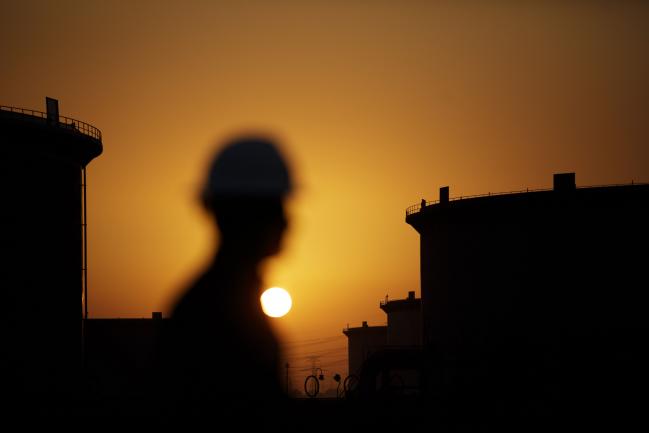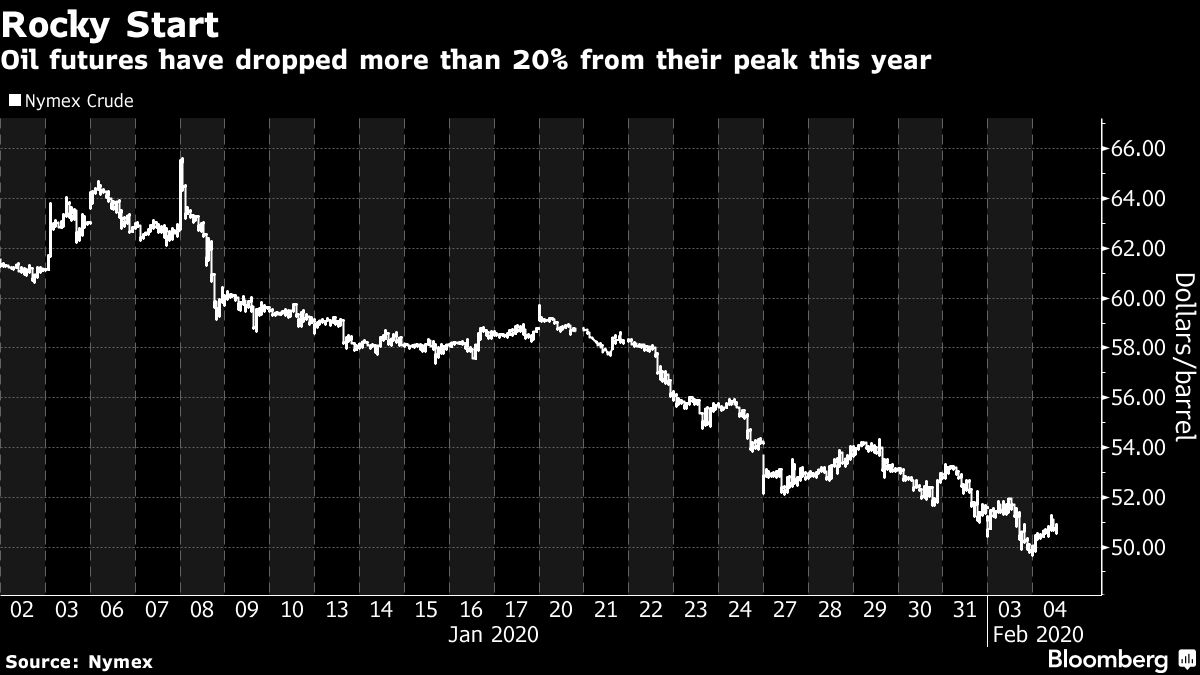(Bloomberg) -- OPEC+ consulted with China in an urgent assessment of how the coronavirus may hurt oil demand, and what measures the group could take in response.
The unusual appearance at the cartel’s headquarters of Wang Qun, China’s ambassador to international organizations in Vienna, underscores how the outbreak has upended the global market. Crude sank below $50 a barrel in New York for the first time in more than a year on Monday on signs that fuel consumption in the world’s biggest oil importer may have plunged by as much 3 million barrels a day, or about 20%.
The Organization of Petroleum Exporting Countries’ own internal analysis, presented in the Austrian capital on Tuesday, showed a more modest impact.It predicted a drop in global demand growth of about 400,000 barrels a day on average from the epidemic even in the worst-case scenario, according to delegates.
After meeting with experts on the OPEC+ Joint Technical Committee, Wang told reporters that the virus would inevitably affect oil demand, but cautioned against overreacting. Behind closed doors, he told cartel officials that the impact would be limited and localized, said delegates, who asked not to be named because the talks were private.
“Any exaggeration and any overreaction is not in the best interest of the general public let alone the market,” Wang told reporters.
It’s no easy task for OPEC and its allies to evaluate the impact of the disease, which continues to infect and kill more people, while causing massive economic disruption. China’s growth forecasts have been cut as the impact on businesses grows, while BP (LON:BP) Plc predicted the epidemic could wipe out 300,000 to 500,000 barrels a day for 2020 as a whole, about a third of global oil demand growth.
“For oil markets, this is the worst crisis, at the worst place, and the worst time,” said Roger Diwan, vice president of financial services at IHS Markit Ltd. “OPEC has no option but to cut production as China is going to buy a lot less crude.”
The meeting of the JTC will continue on Wednesday. Its assessment may help determine whether the 23-nation alliance -- which pumps about half the world’s oil -- convenes an emergency ministerial meeting later this month to consider new production cuts. Saudi Arabia, OPEC’s biggest member, has been pushing for such a gathering, but has faced some reluctance from Russia.
OPEC+ only just started a fresh round of deeper cutbacks last month, the latest step in a three-year effort to prevent plentiful U.S. shale supplies putting the global market into surplus. But the outlook has deteriorated rapidly in the last few weeks as the coronavirus curbs air traffic and slows China’s economy.
“Given oil’s fast and furious fall -- and the havoc that it could wreak on government finances across the producer group -- it looks like they don’t believe they have the luxury of time,” said Helima Croft, chief commodities analyst at RBC Capital Markets LLC.
OPEC’s research department in Vienna has prepared two models with different estimates of how the virus may affect oil consumption, according to a delegate. The worst-case scenario envisaged a fast-spreading epidemic that lasts six months and wipes out about 400,000 barrels a day of demand, before a market rebound to pre-virus growth levels in the second half of the year.
If OPEC+ were to maintain its current output reductions throughout that period, there would be a surplus of 600,000 barrels a day in the first quarter and 1 million in the second, the analysis showed. The committee hadn’t yet discussed whether the group should deepen its cutbacks, delegates said.
Reluctant Russia
While West Texas Intermediate, the U.S. benchmark, rose about 1% on Tuesday, it was only the second increase since Jan. 17. The U.S. benchmark slipped below $50 on Monday for the first time in more than a year. Prices are far below the levels that most OPEC members need to cover government spending.
While Riyadh has urged fellow producers to meet and act, there’s so far been a more cautious attitude from its most important partner, Russia. Though not an OPEC member itself, Moscow has proved to be an influential voice since the OPEC+ alliance was established three years ago.
Russian President Vladimir Putin and Saudi King Salman bin Abdulaziz discussed the global energy markets by phone Monday evening, the Kremlin said in a statement, adding that both leaders confirmed “readiness to continue cooperation within OPEC+.”
Moscow doesn’t face the same budgetary need for elevated oil prices as most OPEC members. Energy Minister Alexander Novak said on Tuesday his country is prepared to meet this month, and intervene if necessary, but the impact of the virus should be assessed first.
Delegates from both Saudi Arabia and Russia will attend the JTC, which also includes Algeria, Iraq, Kazakhstan, Kuwait, Nigeria and the United Arab Emirates.
(Updates with details of OPEC analysis in third paragraph.)

